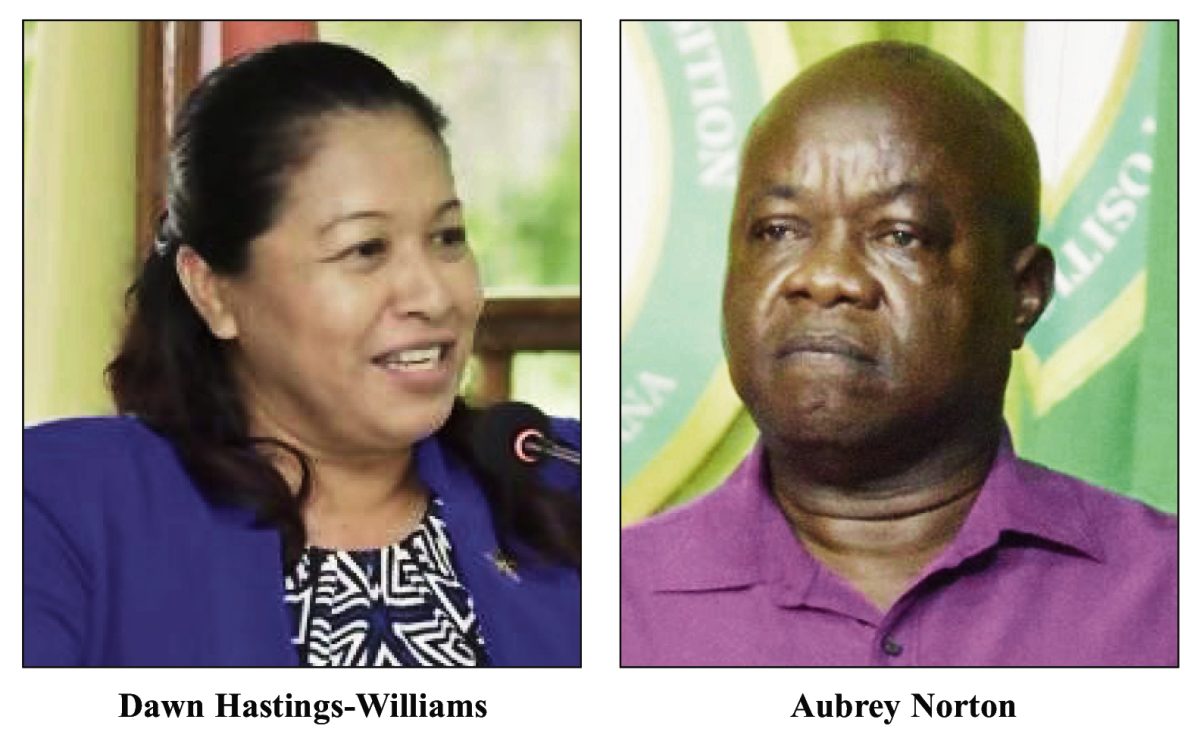The People’s National Congress Reform (PNCR) is abuzz with preparations for its much-anticipated 22nd Biennial Congress, slated for June 28th to 30th, with the elections for key positions including party leader expected to steal the limelight.
In a recent interview with this newspaper, PNCR General Secretary Dawn Hastings-Williams revealed that also among the highlights are the grand opening featuring keynote addresses from party top brass and the General Secretary’s report. The climax will be the elections on June 30th.
This was solidified during the PNCR’s recent Central Executive Committee (CEC) meeting, where leaders agreed on the Congress’ pivotal dates, she said.
The congress is being held under the theme, “Forming the Next Government: Building a Just, Inclusive, and Prosperous Society for All,” as the PNCR reaffirms its steadfast commitment to returning to governance, echoing the aspirations of its constituents nationwide, she told this newspaper. Further, in a departure from the hybrid format of the 21st Congress, this year’s event promises the physical presence of all members and delegates from the ten regions, fostering robust engagement and camaraderie.
To ensure seamless execution, dedicated groups have been established to meticulously plan the congress. Committee members, identified during the CEC meeting, have already convened thrice, and there is to be another CEC session on Wednesday.
Hastings-Williams said she was actively engaged in the preparations for the upcoming congress and was confident that plans are proceeding smoothly.
Membership forms had earlier been dispatched to regional chairs, empowering them to nominate candidates based on accreditation team-verified eligibility. The deadline for submissions was June 3rd. And the selection of the returning officer was underway at the time of the interview.
Addressing the contentious issue surrounding the purported suspension of the PNCR’s international arms, the General Secretary swiftly debunked rumours, stating unequivocally, “they have not been suspended”. Instead, she said, a committee was convened to delve into the matter, leveraging the constitutional provision that permits regions to designate themselves as other names, example “Friends of the PNCR”. This, in turn, opened avenues for participation, but complications arose when the North American Region (NAR) extended its embrace to an additional corporate body based in the United States.
The CEC swiftly intervened, halting any further engagements until a conclusive decision could be reached. However, despite directives to hold off, some groups proceeded, prompting the CEC to make the decision to not recognize the NAR body, sparking further discord. Subse-quent dialogues, facilitated by the party’s leadership, aimed to address these issues, with the Leader meeting directly with the concerned parties and instructing them to communicate through the secretariat channels, she revealed.
Another concern raised pertained to requests from members to inspect membership lists. The General Secretary clarified that while the Constitution mandates members’ entitlement to inspect these lists, the process is governed by specific protocols. Only the chairman or secretary of a group holds the authority to request a printout of the list, a stance that contradicts the broader constitutional provision granting any member the right to request access to the list.
Turning to the allocation of automatic delegates, the General Secretary outlined the criteria, emphasizing the imperative of financial compliance. While the final number of delegates remains undetermined, the formula dictates one delegate for every ten members within a group, exemplifying a pragmatic approach to representation.
The Congress Committee, formed by the CEC, plays a crucial role in maintaining fairness and representation in the party’s main event. It reflects the party’s dedication to democratic principles, she said.
However, amidst these deliberations, a curious incident involving a misplaced CPU cast a shadow of uncertainty. The General Secretary said her cautious approach, in which she refrained from issuing statements until clarity was attained, underscored the gravity of the situation. While the CPU was eventually returned, questions lingered regarding the fulfillment of promises regarding a technical audit by an external expert, a matter to which the General Secretary responded, “not to my knowledge.”
In essence, the General Secretary’s remarks reflected the intricate interplay between procedural adherence and democratic principles within the PNCR.
Meanwhile, incumbent PNCR Leader Aubrey Norton emphasized in an interview with Stabroek News that the next crucial step in his preparation for congress was to efficiently coordinate the activities of the committees and promptly dispatch correspondence with specified deadlines. To ensure transparency, the membership undergoes accreditation by a separate committee situated away from the congress venue. Once accredited, the membership is forwarded to the returning officer. In the meantime, the committees are diligently working on various crucial aspects such as logistics, accommodation, and transportation to guarantee the resounding success of the congress, he stated.
When probed about the CPU matter, he confidently stated that the issuance of the membership demonstrated that the matter was swiftly resolved and was never a substantial issue, but an attempt to sensationalize a non-issue.
Furthermore, Norton asserted that only after nomination will he acknowledge individuals as legitimate “challengers,” dismissing any premature claims. Confident in his leadership, Norton said he firmly believes he will be reinstated as the leader of the PNCR. He cited his steadfast efforts in building relationships and fostering communication with all party groups since assuming leadership. With regard to the allegations about the financial reports, he firmly stated that rigorous audits were carried out and that publicizing the audits was unnecessary, drawing a parallel to the PPP/C’s practice as validation of their actions.






